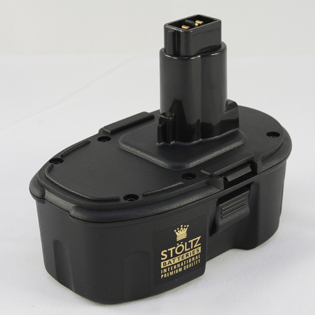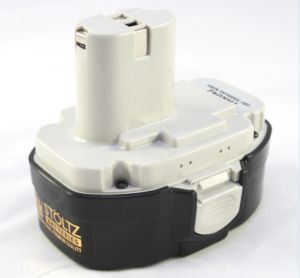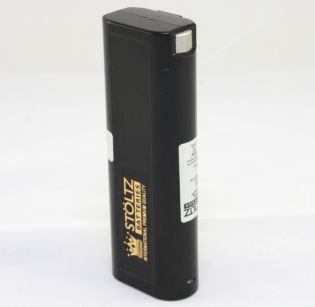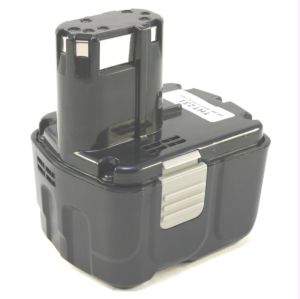Cordless Drill Battery Type Decision: NiMH vs. NiCad vs. Li-Ion
If you've ever wondered about the difference between NiMH vs. NiCad vs. LiIon you're not alone - there are thousands of DIY home improvement types out there wondering the same thing as you, and wondering how to make the best decisions for their next power tool purchase.

Here's a question you may be asking yourself: "What is the difference between NiMH and NiCd. How do Lithium Ion batteries work compared to the others?"
To tackle this question we have to look at the criteria for making the power tool battery decision. And then bring Lithium Ion into the equation to round out the choices when you're next making a power tool purchase decision.
Read closely - your power as a consumer lies in your understanding of the products available!
Criteria for Making Your Power Tool Battery Decision According to Building a Better Power-Tool Battery you should be looking at a battery's run time, life cycle, volts and amp-hour rating.
Run Time:
Quite simply run time is the amount of work a tool can do before its charge runs out.
Life Cycle:
Life cycle is how many times the battery can be recharged during its life time.
Volts (Power):
Volts will determine work output of the tool. John Sara, cordless product manager for Milwaukee Electric Tool, says "Individuals currently using a 18-volt NiCad battery, should see 2 - 2 & 1/2 times more work output from a V28."
Amp-Hour Rating
The higher the Amp-Hour rating the longer the battery lasts - be aware that power tool batteries of the same voltage will often have different Amp-Hour ratings.
NiMH vs. NiCad vs. Li Ion: Picking What's Right for You
Nickel metal hydride (NiMH) Batteries:
I don't think I could define it better than wiki pedia: 'A nickel metal hydride battery, abbreviated NiMH, is a type of rechargeable battery similar to a nickel-cadmium (NiCd) battery but has a hydrogen-absorbing alloy for the anode instead of cadmium. Like in NiCd Dewalt batteries, nickel is the cathode.

Nickel metal hydride (NiMH) advantages:
-- lighter than NiCad
-- 2-3X capacity to equal size NiCad
Nickel metal hydride (NiMH) disadvantages:
-- fewer life cycles compared to NiCad
-- shorter run time
-- performs the worst in cold temperatures, so keep that in mind if you plan to use tools powered by NiMH outdoors in cold weather
-- higher self-discharge level than NiCad
-- voltage drop at near-discharged levels
Nickel cadmium (NiCd) Batteries:
According to Wiki pedia: the 'nickel-cadmium battery (commonly abbreviated NiCd and pronounced 'nye-cad') is a popular type of rechargeable battery for portable electronics and toys using the metals nickel (Ni) and cadmium (Cd) as the active chemicals.

Nickel cadmium (NiCad) advantages:
-- longer life cycles
-- performs in cold temperatures (perform well to 20F)
-- lower self-discharge level than NiMH
-- no voltage drop at near discharged levels
Nickel cadmium (NiCad) disadvantages:
- Heavy, making it harder to use for longer periods of time
-- May suffer from 'Memory Effect' or 'False Bottom Effect' if constantly discharged half-way and then recharged (wiki pedia)
The Lithium ion (Li-Ion) Battery:
The new comer to Hitachi power tool batteries, Lithium Ion are hot because they have 'one of the best energy-to-weight ratios, no memory effect and a slow loss of charge when not in use,' according to Wiki pedia.

Lithium ion (Li-Ion) advantages:
-- High performance in cold weather - to 0F - great for winter outdoor use
-- Light weight. You can lift tools powered by Lithium Ion over your head all day.
-- Increased life cycles over NiCad and NiMH, so it keeps going past other batteries
-- more rapid charge times that get you back on the job more quickly
Lithium ion (Li-Ion) disadvantages:
-- less tested than other battery formats - in early stages of development
-- has a shelf life based on life of battery, not related to charge or charge time
-- can sometimes erupt or explode in high heat - hot cars, direct sunlight, etc, or sometimes after tampering. a more dangerous battery than the others
-- permanent damage to battery if stored at too-low discharge level, so be careful and keep these charged well
What battery is right for your power tool decision? Clearly there are many different options, and many different pluses and minuses for each battery type. That's why it's imperative that you come to your purchase prepared with knowledge that will help you make the right decision for your situation.
Plus you are certain to impress the guys at the big box tool depot when you display your knowledge about the different types of batteries and their different merits.
Now you know what to look for - life cycles, run time, volts and Amp-Hours and you know the three major battery types. I hope that with that information you'll be better equipped to make the decision between a NiCD, NiMH or Li-Ion battery!